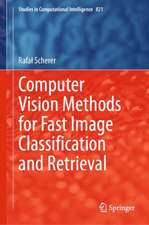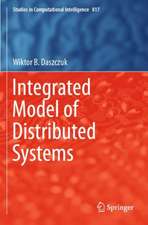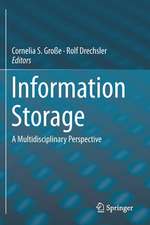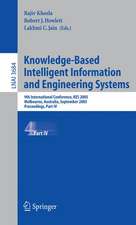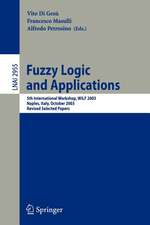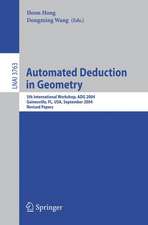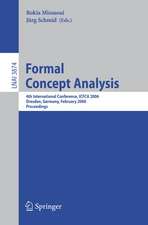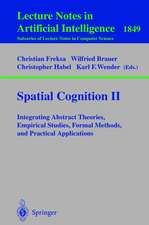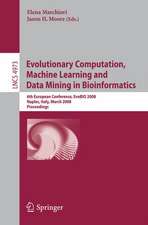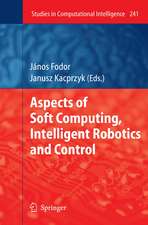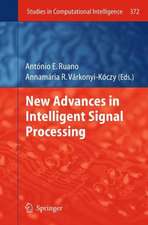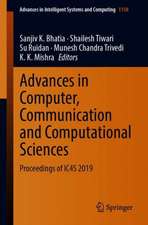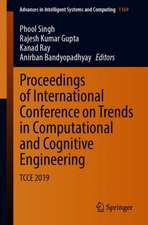New Concepts and Applications in Soft Computing: Studies in Computational Intelligence, cartea 417
Editat de Valentina Emilia Balas, János Fodor, Annamária R. Várkonyi-Kóczyen Limba Engleză Paperback – 9 aug 2014
The book provides a sample of research on the innovative theory and applications of soft computing paradigms.
The idea of Soft Computing was initiated in 1981 when Professor Zadeh published his first paper on soft data analysis and constantly evolved ever since. Professor Zadeh defined Soft Computing as the fusion of the fields of fuzzy logic (FL), neural network theory (NN) and probabilistic reasoning (PR), with the latter subsuming belief networks, evolutionary computing including DNA computing, chaos theory and parts of learning theory into one multidisciplinary system. As Zadeh said the essence of soft computing is that unlike the traditional, hard computing, soft computing is aimed at an accommodation with the pervasive imprecision of the real world. Thus, the guiding principle of soft computing is to exploit the tolerance for imprecision, uncertainty and partial truth to achieve tractability, robustness, low solution cost and better rapport with reality. In the final analysis, the role model for soft computing is the human mind.
We hope that the reader will share our excitement and find our volume both useful and inspiring.
| Toate formatele și edițiile | Preț | Express |
|---|---|---|
| Paperback (1) | 642.33 lei 6-8 săpt. | |
| Springer Berlin, Heidelberg – 9 aug 2014 | 642.33 lei 6-8 săpt. | |
| Hardback (1) | 647.61 lei 6-8 săpt. | |
| Springer Berlin, Heidelberg – 21 iul 2012 | 647.61 lei 6-8 săpt. |
Din seria Studies in Computational Intelligence
- 20%
 Preț: 449.37 lei
Preț: 449.37 lei - 20%
 Preț: 1158.26 lei
Preț: 1158.26 lei - 20%
 Preț: 986.66 lei
Preț: 986.66 lei - 20%
 Preț: 1452.76 lei
Preț: 1452.76 lei - 20%
 Preț: 168.78 lei
Preț: 168.78 lei - 20%
 Preț: 1291.10 lei
Preț: 1291.10 lei - 18%
 Preț: 1112.30 lei
Preț: 1112.30 lei - 20%
 Preț: 565.39 lei
Preț: 565.39 lei - 20%
 Preț: 649.28 lei
Preț: 649.28 lei - 20%
 Preț: 1047.73 lei
Preț: 1047.73 lei - 20%
 Preț: 1578.96 lei
Preț: 1578.96 lei - 20%
 Preț: 643.50 lei
Preț: 643.50 lei - 20%
 Preț: 657.49 lei
Preț: 657.49 lei - 20%
 Preț: 993.28 lei
Preț: 993.28 lei - 20%
 Preț: 990.80 lei
Preț: 990.80 lei - 20%
 Preț: 989.96 lei
Preț: 989.96 lei - 20%
 Preț: 1165.69 lei
Preț: 1165.69 lei - 20%
 Preț: 1444.52 lei
Preț: 1444.52 lei - 20%
 Preț: 1041.96 lei
Preț: 1041.96 lei - 20%
 Preț: 1047.73 lei
Preț: 1047.73 lei - 20%
 Preț: 1046.06 lei
Preț: 1046.06 lei - 18%
 Preț: 2500.50 lei
Preț: 2500.50 lei - 20%
 Preț: 989.13 lei
Preț: 989.13 lei - 20%
 Preț: 1165.69 lei
Preț: 1165.69 lei - 20%
 Preț: 1164.05 lei
Preț: 1164.05 lei - 20%
 Preț: 1042.79 lei
Preț: 1042.79 lei - 20%
 Preț: 1460.19 lei
Preț: 1460.19 lei - 18%
 Preț: 1403.52 lei
Preț: 1403.52 lei - 18%
 Preț: 1124.92 lei
Preț: 1124.92 lei - 20%
 Preț: 1039.47 lei
Preț: 1039.47 lei - 20%
 Preț: 1008.11 lei
Preț: 1008.11 lei - 20%
 Preț: 1045.25 lei
Preț: 1045.25 lei - 20%
 Preț: 1275.42 lei
Preț: 1275.42 lei - 20%
 Preț: 1040.32 lei
Preț: 1040.32 lei - 20%
 Preț: 988.32 lei
Preț: 988.32 lei - 20%
 Preț: 1169.79 lei
Preț: 1169.79 lei - 20%
 Preț: 1162.37 lei
Preț: 1162.37 lei - 20%
 Preț: 1059.26 lei
Preț: 1059.26 lei - 20%
 Preț: 1164.05 lei
Preț: 1164.05 lei - 20%
 Preț: 1166.52 lei
Preț: 1166.52 lei - 20%
 Preț: 1459.38 lei
Preț: 1459.38 lei - 18%
 Preț: 1005.74 lei
Preț: 1005.74 lei - 20%
 Preț: 997.38 lei
Preț: 997.38 lei - 20%
 Preț: 1055.94 lei
Preț: 1055.94 lei - 20%
 Preț: 1284.47 lei
Preț: 1284.47 lei - 20%
 Preț: 994.08 lei
Preț: 994.08 lei - 20%
 Preț: 1048.72 lei
Preț: 1048.72 lei - 20%
 Preț: 1066.02 lei
Preț: 1066.02 lei - 20%
 Preț: 943.78 lei
Preț: 943.78 lei - 20%
 Preț: 1173.10 lei
Preț: 1173.10 lei
Preț: 642.33 lei
Preț vechi: 802.90 lei
-20% Nou
Puncte Express: 963
Preț estimativ în valută:
122.94€ • 132.70$ • 103.08£
122.94€ • 132.70$ • 103.08£
Carte tipărită la comandă
Livrare economică 19 aprilie-03 mai
Preluare comenzi: 021 569.72.76
Specificații
ISBN-13: 9783642445279
ISBN-10: 3642445276
Pagini: 232
Ilustrații: X, 222 p.
Dimensiuni: 155 x 235 x 12 mm
Greutate: 0.33 kg
Ediția:2013
Editura: Springer Berlin, Heidelberg
Colecția Springer
Seria Studies in Computational Intelligence
Locul publicării:Berlin, Heidelberg, Germany
ISBN-10: 3642445276
Pagini: 232
Ilustrații: X, 222 p.
Dimensiuni: 155 x 235 x 12 mm
Greutate: 0.33 kg
Ediția:2013
Editura: Springer Berlin, Heidelberg
Colecția Springer
Seria Studies in Computational Intelligence
Locul publicării:Berlin, Heidelberg, Germany
Public țintă
ResearchCuprins
From the content: Combined Haar-Hilbert and Log-Gabor Based Iris Encoders.- Single-stroke Character Recognition with Fuzzy Method.- Color-based Image Retrieval Approaches Using a Relevance Feedback Scheme.- Real-valued Implication as Generalized Boolean Polynomial.- Value Generator of Maximum Power Point Coordinates of the Photovoltaic Panel External Characteristic.- Shadowed Fuzzy Sets: A Framework with More Freedom Degrees for Handling Uncertainties than Interval Type-2 Fuzzy Sets and Lower Computational Complexity than General Type-2 Fuzzy Sets.
Textul de pe ultima copertă
The book provides a sample of research on the innovative theory and applications of soft computing paradigms.
The idea of Soft Computing was initiated in 1981 when Professor Zadeh published his first paper on soft data analysis and constantly evolved ever since. Professor Zadeh defined Soft Computing as the fusion of the fields of fuzzy logic (FL), neural network theory (NN) and probabilistic reasoning (PR), with the latter subsuming belief networks, evolutionary computing including DNA computing, chaos theory and parts of learning theory into one multidisciplinary system. As Zadeh said the essence of soft computing is that unlike the traditional, hard computing, soft computing is aimed at an accommodation with the pervasive imprecision of the real world. Thus, the guiding principle of soft computing is to exploit the tolerance for imprecision, uncertainty and partial truth to achieve tractability, robustness, low solution cost and better rapport with reality. In the final analysis, the role model for soft computing is the human mind.
We hope that the reader will share our excitement and find our volume both useful and inspiring.
Caracteristici
State of the art of Soft Computing New concepts and applications in Soft Computing Written by leading experts in this field Includes recent theoretical foundations and practical applications as extended works presented in the International Workshop SOFA 2009, SOFA 2010 and additional papers



